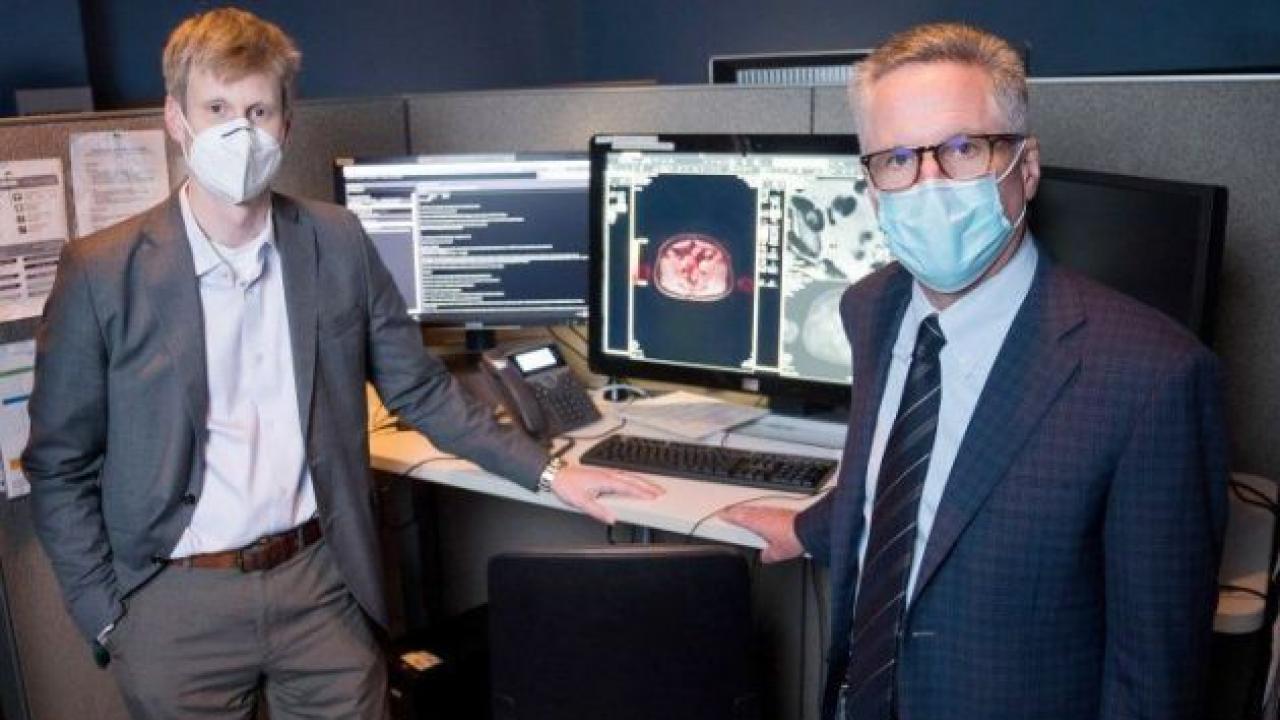
Thomas Hope (left), MD, and Peter Carroll, MD, chair of the Urology Department, stand at the PACS workstation where the images from the PSMA PETs are viewed and interpreted. The new imaging technique received FDA approval. Photo by Maurice Ramirez
The University of California’s two nationally ranked medical centers, UC San Francisco and UCLA, and their nuclear medicine teams have obtained approval from the U.S. Food and Drug Administration to offer a new imaging technique for prostate cancer that locates cancer lesions in the pelvic area and other parts of the body to which the tumors have migrated.
Known as prostate-specific membrane antigen PET imaging, or PSMA PET, the technique uses positron emission tomography in conjunction with a PET-sensitive drug that is highly effective in detecting prostate cancer throughout the body so that it can be better and more selectively treated. The PSMA PET scan also identifies cancer that is often missed by current standard-of-care imaging techniques.
“UCLA and UCSF researchers studied PSMA PET to provide a more effective imaging test for men who have prostate cancer,” said Jeremie Calais, MD, MSc, an assistant professor at the David Geffen School of Medicine at UCLA. “Because the PSMA PET scan has proven to be more effective in locating these tumors, it should become the new standard of care for men who have prostate cancer, for initial staging or localization of recurrence.”
A clinical trial conducted by the UCSF and UCLA research teams on the effectiveness of PSMA PET proved pivotal in garnering FDA approval for the technique at both universities. The PSMA drug used in the technique was developed outside the U.S. by the University of Heidelberg.
“It is rare for academic institutions to obtain FDA approval of a drug, and this unique collaboration has led to what is one of the first co-approvals of a drug at two institutions,” said Thomas Hope, MD, an associate professor at UCSF. “We hope that this first step will lead to a more widespread availability of this imaging test to men with prostate cancer throughout the country.”
How It Works
For men who are initially diagnosed with prostate cancer or who were previously treated but who have experienced a recurrence, a critical first step is to understand the extent of the cancer. Physicians use medical imaging to locate cancer cells so they can be treated.
PSMA PET works using a radioactive tracer drug called 68Ga-PSMA-11, which is injected into the body and attaches to proteins known as prostate-specific membrane antigens. Because prostate cancer tumors overexpress these proteins on their surface, the tracer enables physicians to pinpoint their location.